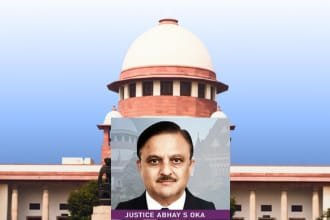The Supreme Court of India on 20 August 2025 dismissed the review petitions filed by the State of West Bengal challenging its April 3, 2025 judgment that invalidated nearly 25,000 teaching and non-teaching appointments made by the West Bengal School Service Commission (SSC) in 2016.
A Bench comprising Justice PV Sanjay Kumar and Justice Satish Chandra Sharma upheld the earlier ruling, observing that the “entire selection was compromised” and reiterating that protecting the sanctity of public recruitment processes must take priority over individual hardships.
What the Supreme Court Held
The Court refused to reopen the matter, noting that the April 3 judgment had already been delivered after exhaustive hearings and careful consideration of both factual and legal aspects.
Key observations included:
- Illegality in the Recruitment Process:
The Court found that the recruitment process conducted by the West Bengal SSC in 2016 was vitiated by fraud and corruption. - Findings of Committees and CBI:
Reports of the Justice (Retd.) Bag Committee and the Central Bureau of Investigation (CBI) revealed grave irregularities. Even the West Bengal Central School Service Commission and the West Bengal Board of Secondary Education, in their affidavits, admitted lapses. - Loss of OMR Sheets:
The SSC’s failure to preserve original OMR sheets or their mirror copies was seen as a critical lapse. Without this evidence, verification of candidates’ claims became impossible, raising suspicion of manipulation. - Cover-up by Authorities:
The Court remarked that attempts by authorities to cover up lapses and illegalities further tainted the process. This led to the conclusion that the entire recruitment was compromised. - Protection of Sanctity of Selection:
The Bench emphasized that maintaining the purity of public recruitment was paramount. Even though many untainted candidates might suffer, the Court prioritized the integrity of the system.
Background of the Case
The controversy dates back to the 2016 recruitment drive by the West Bengal School Service Commission to fill thousands of posts in government and aided schools.
- Allegations of a cash-for-jobs scam soon emerged, implicating senior officials, politicians, and intermediaries.
- On April 22, 2024, the Calcutta High Court invalidated these appointments, citing systemic fraud and corruption.
- The matter was escalated to the Supreme Court, which on April 3, 2025, upheld the High Court’s ruling and quashed the appointments en bloc.
The West Bengal government later sought a review of this decision, arguing that genuine candidates would be unfairly punished. However, the apex court has now rejected the review, maintaining its earlier stance.
Key Legal Principles Highlighted
- Fraud Vitiates Everything:
The Court reiterated that once a selection process is proven to be tainted by fraud, the entire exercise loses legitimacy, irrespective of the number of innocent candidates affected. - Primacy of Public Interest:
Recruitment to government posts must be free from corruption, nepotism, and favoritism. The Court held that the sanctity of process outweighs individual hardship. - Limited Scope of Review:
The Court clarified that a review petition cannot be used to reargue the case on merits. Since the April 3 judgment was based on comprehensive deliberation, no grounds for review existed.
Adverse Remarks Against Authorities
The Supreme Court also endorsed the adverse remarks made earlier against officials involved in the scam. The Bench observed that these authorities were “wholly and solely responsible” for the imbroglio that devastated the lives of both tainted and untainted candidates.
The judgment noted that attempts to manipulate, cover up, and destroy evidence compounded the gravity of the fraud, justifying strong judicial criticism.
Impact on Candidates
The Court acknowledged the anguish and heartburn among untainted candidates who lost their jobs despite being innocent. However, it clarified that:
- Allowing even a partially tainted recruitment to stand would permanently damage the credibility of the public selection process.
- The interests of untainted candidates have been protected “to an extent” within the framework of law, though not through reinstatement.
Political and Administrative Fallout
The West Bengal SSC recruitment scam has had major political and administrative implications:
- It has triggered widespread public protests and loss of confidence in the recruitment process.
- Several political leaders and officials have faced *criminal proceedings, with ongoing investigations by the CBI.
- The quashing of 25,000 appointments has left a vacuum in schools, leading to shortage of staff and disruption in education.
Case Title and Citation
- Case: State of West Bengal v. Baishakhi Bhattacharyya (Chatterjee) & Ors., R.P (C) No. 1729 of 2025 and connected petitions
- Citation: [Supreme Court Judgment, 20 August 2025]
Why This Judgment Matters
- Strengthens Judicial Oversight:
The ruling underscores the judiciary’s commitment to upholding fairness and transparency in public recruitment. - Message Against Corruption:
By invalidating the entire selection process, the Court sends a strong deterrent message against corruption in recruitment. - Precedent for Future Cases:
This case may serve as a precedent in future disputes involving large-scale recruitment scams in India. - Restoring Faith in the System:
Though painful for some candidates, the decision ultimately protects the long-term integrity of public service recruitment.
Conclusion
The Supreme Court’s refusal to review its April 3 decision in the West Bengal SSC recruitment scam case highlights the judiciary’s determination to uphold transparency, accountability, and fairness in public employment. By affirming that the “entire selection was compromised”, the Court placed institutional integrity above individual hardship, sending a clear message that corruption in recruitment cannot and will not be tolerated.
As investigations continue and the state grapples with the fallout, this judgment will be remembered as a landmark in India’s fight against recruitment frauds, ensuring that public sector jobs remain a symbol of merit and trust.


